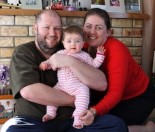Postnatal Depression (PND) affects between 10 and 20 percent of new mothers in New Zealand and often goes undiagnosed, not least because of the notion that motherhood is all happy and rosy! In her book, Dr Sara Weeks says that it’s time to deal to the stigma around postnatal depression and to equip women (and their partners) with knowledge and techniques, so that they can cope better with one of the biggest changes in their life. Without prejudice. We spoke to Dr Weeks and asked her for some suggestions for dealing with PND.
We know that pregnancy and having a newborn is a tough time for lots of people – what signs might suggest that someone is experiencing PND?
While feeling tired and overwhelmed in those first weeks and months is part and parcel of having a new baby, feeling constantly sad or so anxious that you can’t stop worrying are not. Generally you will feel better after a good sleep, but if you still feel tired or blue, then this is a warning sign. Not being able to feel some pleasure in your baby is also a warning sign. While it often takes some time to “fall in love with your baby” not being able to enjoy them is something different. Despite being really tired, you may be unable to fall asleep when the opportunity is there, or may wake before your baby, waiting for him to cry. Feeling really bad about yourself, losing interest in activities which usually bring you pleasure, being really irritable, or alternatively feeling flat or numb are also warning signs you may be depressed. Having thoughts of harming yourself or your baby require urgent assessment, even if you know you would never act on them.
What advice would you give someone who is struggling before or after the birth of a baby?
Marshall as much support as you can from those around you – most friends and family members are only too happy to watch baby or take him out for a walk while you catch up on some much-needed sleep. If you don’t feel significantly better after a good sleep, then it would be sensible to have a chat about how you feel to your LMC or GP. Make sure you look after yourself – eat well, and get some time out, even if it’s just lying in the bath with a magazine! Don’t struggle on alone, putting on a brave face – it’s really important to tell someone how you feel and get help and support.
What advice can you offer someone who thinks that a friend or family member is experiencing PND?
If you think your loved one may have PND, offer as much support as you are able, both practical and emotional, and encourage her to talk, listening in a non-judgemental manner. You may need to be very tactful in bringing up the subject as some might experience your concern as an accusation. You could mention you have read a book about coping with the vicissitudes of motherhood and wonder if she would like to have a look as there might be some useful advice! If you are really concerned and she will not seek help, then talk to her partner about his experience of how she is, and the need to seek treatment. If you are extremely and urgently concerned, call a helpline (the numbers for the different areas are in the book) and seek assistance as to what to do.
If you think that you might be at risk of PND, are there things that you can do to help?
If you have risk factors such as a past or family history of depression, bipolar disorder or post partum psychosis, you need to discuss this with your LMC during pregnancy so that appropriate referral can be made to experts in dealing with this area. If you are otherwise concerned, having experienced severe PMS, past trauma, or social isolation, or are just feeling a bit vulnerable, ensuring that you have plenty of support, sleep as much as possible, eat well, and talk to someone regularly about how you are coping. If your mood starts to go down, or you become increasingly anxious, talk to your LMC or GP about this and ask for help.
DEPRESSION – Clare’s story
Clare and Edward had been together for ten years and married for three when they had their first child, Ted. Clare was 37 and she worried a bit about her age and the increased risk of chromosomal abnormalities, but the blood tests and scan showed that there was only a low risk.
The pregnancy progressed well and when she finished work at 34 weeks (earlier than she had planned, but she was so tired and her feet started swelling after standing all day), she threw herself into the business of being a good wife (and soon-to-be mother). At ten days past her due date, the obstetrician suggested that it might be a good idea to induce labour. It didn’t seem to work and she ended up with an epidural and then a caesarean, neither of which she had wanted, but baby’s safety came first.
While watching the news in hospital, which had an item about a school shooting in America, Clare burst into tears – how could she have brought a baby into this horrible world? – this must be the third day blues she had heard about. Clare felt terribly vulnerable, both for herself and Ted, unaccountably sad and overwhelmed. The ward staff seemed to be critical of her, and a passing comment between two midwives about older mothers got her really upset. When Edward arrived to take her home she again burst into tears. Clare had been looking forward to this so much, but now the moment had arrived she was just scared. She couldn’t even drive or lift Ted properly. It was a relief to be home, though, and Edward was so helpful, letting her rest and sleep and she started to feel rather better. Perhaps all her tears and fears had been unfounded and were just the third day blues.
Over the next few weeks Clare recovered from her operation and got into the swing of feeding and changing Ted, keeping the house clean and tidy and welcoming visitors. When Ted was six weeks old Clare took him along to her postnatal check with the obstetrician. When she asked Clare about her mood she was able to reply truthfully that she felt fine.
Only a few days later, though, things changed. It was a sunnyday and she was sitting outside with Ted when quite suddenly it seemed that the brightness had been taken out of the day, almost as though a filter had slid down over her eyes. She felt cold, even numb, and curiously detached as she placed Ted in his bassinet and started to tidy the kitchen, although it was already perfectly acceptable. Dinner was already prepared and Ted was dozing, but rather than the satisfaction she usually experienced she felt . . . nothing. She couldn’t even raise a smile when Edward came home. She would feel better after a good sleep, surely. When Ted woke she managed to get up and feed him, though she felt in a bit of a daze. When she got back into bed, rather than falling asleep easily as she usually did, she lay awake feeling rather anxious – whatever she thought about seemed to be perplexing and vaguely threatening.
When Ted woke up, Clare tended to him as usual but without her usual joy and pleasure. She went shopping, but when Ted started crying she felt all the other shoppers were looking at her, critical of her inability to keep her baby quiet. She felt like crying herself. The day passed in a blur – it was like thinking and moving through glue! Her limbs felt heavy, she had a dull headache and her memory didn’t seem to work. That evening she told Edward what had happened, he suggested seeing her GP and made the appointment himself.
She visited the GP and told him that she felt sad, was terribly tired and just didn’t feel any pleasure or joy. He asked whether she had thought of harming herself or Ted. Clare was rather shocked at this – she wasn’t that bad, just a bit low and tired. The GP said that although he would check her iron and thyroid levels, it sounded like she had postnatal depression. He told her it was quite common, and very treatable with antidepressants and counselling. Clare was uncertain about taking medication but the GP reassured her that it only got into the breast milk in tiny amounts and would be very unlikely to affect Ted. The next morning, Clare took her first quarter tablet of antidepressant. She then felt strangely better – at least she had done something to help herself. Over the next fortnight, Clare began to notice an improvement in the horrible feeling of flat numbness and began to enjoy Ted.
Reproduced with permission from Mothers Cry Too by Dr Sara Weeks. Published by Penguin Group NZ. RRP $35.00. Copyright © Sara Weeks, 2013.
Dr Sara Weeks has spent more than 20 years counselling women with PND. She works in both the private and public sectors in New Zealand, and is Lead Clinician for Lotofale Pacific Island Mental Health Service with the Auckland District Health Board. Sara is also involved in research on postnatal depression in Pacific Island women, and teaches perinatal psychiatry for the post-graduate diploma in Obstetrics and Gynaecology. She is a mother of three and grandmother of one.






